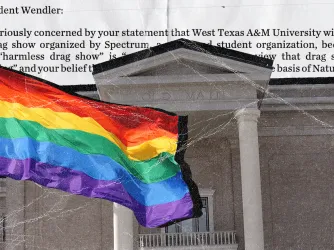Table of Contents
AAUP Extends Criticism of OCR 'Preponderance of the Evidence' Standard, Defends Faculty Rights
The American Association of University Professors (AAUP) has written a second letter (.PDF) to the federal Department of Education's Office for Civil Rights (OCR) in order to extend its criticism of OCR's new "preponderance of the evidence" requirement when colleges adjudicate cases of sexual harassment. The new, lowered standard threatens the free speech and due process rights of faculty members (and students) nationwide.
AAUP's second letter, dated today, August 18, 2011, follows upon the June 27, 2011, letter to OCR from Gregory F. Scholtz, Director of the AAUP's Department of Academic Freedom, Tenure, and Governance. This new letter comes from AAUP President Cary Nelson and Ann E. Green, Chair of AAUP's Committee on Women in the Academic Profession. They write:
While we strongly support the bulk of "Dear Colleague," share your commitment to "providing all students with an educational environment freed from discrimination," and agree that "the sexual harassment of students, including sexual violence, interferes with students' right to receive an education," we are concerned about two areas where academic freedom may potentially be violated. The first concern is the "preponderance of evidence" standard, and the second is the potential violation of academic freedom for those who teach courses with sexuality or sexual content.
Given the seriousness of accusations of harassment and sexual violence and the potential for accusations, even false ones, to ruin a faculty member's career, we believe that the "clear and convincing" standard of evidence is more appropriate than the "preponderance of evidence" standard. Our colleague Gregory Scholtz, Associate Secretary and Director of AAUP's Department of Academic Freedom, Tenure, and Governance, articulated this to you in his June 27th, 2011, letter:
Since charges of sexual harassment against faculty members often lead to disciplinary sanctions, including dismissal, a preponderance of the evidence standard could result in a faculty member's being dismissed for cause based on a lower standard of proof than what we consider necessary to protect academic freedom and tenure. We believe that the widespread adoption of the preponderance of evidence standard for dismissal in cases involving charges of sexual harassment would tend to erode the due-process protections for academic freedom.
We echo his concerns. While clear policy statements and timely responses are key for both the complainant and the accused, preserving a higher standard of proof is vital in achieving fair and just treatment for all. We urge you to reconsider "the preponderance of evidence" standard.
Nelson and Green not only address due process in the letter, but they also voice concerns about free speech and academic freedom in the classroom:
Effective training must differentiate between appropriate course content and harassment. No policy should inhibit intellectual inquiry. Courses like "The Literature of HIV/AIDS," "Human Sexuality," and gender studies courses that directly address sex and sexuality can make some students uncomfortable. Even a first-year writing class that discusses a topic like female genital mutilation or other controversial topic can create discomfort. Any training for faculty, staff, and students should explain the differences between educational content, harassment, and "hostile environments," and a faculty member's professional judgment must be protected. Women's studies and gender studies programs have long worked to improve campus culture by teaching about issues of systemic gender inequity, sex, and sexuality. "Dear Colleague" should encourage discussion of topics like sexual harassment both in and outside of the curriculum, but acknowledge that what might be offensive or uncomfortable to some students may also be necessary for their education.
We appreciate AAUP's further support of fundamental fairness and academic freedom, and we will have more on AAUP's very important letter soon. Stay tuned.
Recent Articles
Get the latest free speech news and analysis from FIRE.

The findings against Harvard are a blueprint for a National Campus Speech Code

VICTORY! 5th Circuit blocks West Texas A&M’s unconstitutional drag ban

Wide-ranging coalition of 'friends of the court' continue to support citizen journalist Priscilla Villarreal in her return to the Supreme Court
